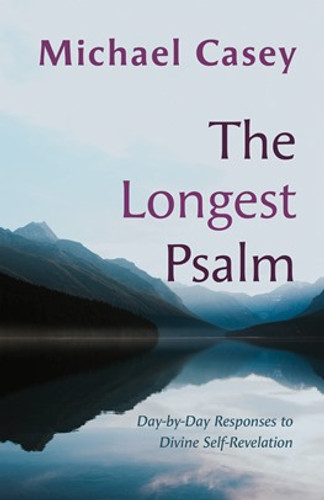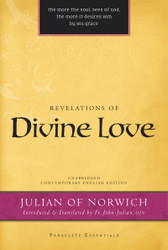As the longest Psalm in the Bible, Psalm 119 comprises 176 verses. Its message sings the praise of Israel’s Law and describes how the faithful should respond to the gift of God’s self-revelation. In The Longest Psalm, Michael Casey offers a meditative reading of each verse of the psalm, intended to be read one at a time, to facilitate a personal prayer and reflection. Psalm 119 brings together elements found throughout the Psalter and the reflections focus on universal themes as well as specific questions of daily life, such as our experience of yearning, service, affliction, and stumbling. Each verse stands alone, intended to be read slowly, like the litanies familiar to Catholic devotion.
Perfect for a brief meditation before beginning the day, Casey invites us to spend time wandering with the psalmist to allow God’s Word to play a significant role in our lives. Through this careful reflection on the longest psalm, readers will discover the text is not merely a psalm to be sung but also a path to be followed.
Product Preview
| Format: | Paperback book |
|---|---|
| Product code: | LP00009 |
| Dimensions: | 5½" x 8½" |
| Length: | 328 pages |
| Publisher: |
Liturgical Press
|
| ISBN: | 9798400800009 |
| 1-2 copies | $26.35 each |
|---|---|
| 3-9 copies | $25.15 each |
| 10-49 copies | $23.96 each |
| 50-99 copies | $23.36 each |
| 100+ copies | $22.46 each |
Praise
Michael Casey’s insightful meditations on Psalm 119, the longest psalm of the Psalter, are to be read slowly and savored. By reflecting on the meaning of each of the Psalm’s 176 verses, he shows us how God’s Torah can form and renew our lives today. Here is a volume to which you can turn for spiritual nourishment and guidance.
God’s self-revelation in Scripture can be known by us through lectio. Fr. Michael Casey has done the homework. All we have to do is turn the page. This book on “the Longest Psalm” is an example of how we can hold and grasp the whole of Hebrew Scripture.
The long, repetitive Psalm 119, like an apparently barren landscape, yields surprising variety and abundance to the practiced, patient gaze. Thanks to Michael Casey’s well-trained eye and long experience, this neglected psalm now receives the attention it deserves. To read this commentary is both to appreciate the psalm and to assimilate rewarding habits of close reading.
Psalm 119 occurs more frequently in the Liturgy of the Hours than any other psalm, but it has long been neglected in commentary because it doesn’t seem to be going anywhere. Michael Casey executes here a successful rescue mission, showing that the very point of the Psalm is that it is staying where it is, celebrating the word of God by turning it over and over like a diamond so that we can appreciate all its facets.
From the author who gave us Sacred Reading, the finest introduction to Lectio Divina that I know, comes this volume in which Michael Casey leads us through a Lectio Divina for Psalm 119. With each biblical verse, Casey plumbs concrete questions of daily life, such as our experience of longing, evil, vanity, and stumbling. Each of the 176 verses of this psalm is given a two-page reflection, perfect for a brief meditation before beginning the day.
If you find Psalm 119 tedious and suppose that its main virtue must lie in its acrostic cleverness, appreciated only in the original Hebrew, this book will make you think again. In a meditative, practical, and sometimes even playful reading of each of the psalm’s 176 verses, Michael Casey shows how the law celebrated in this psalm, far from being something harsh and coercive, is a source of joy and delight, nothing less than the divine self-revelation offering us a pathway to fullness of life. The law, understood in this way, encompasses not only the written word, but the assimilated word, active in our hearts, shaping our outlook and values. The fruit of a Cistercian monk’s long exposure to the psalms, singing them, as verse 146 says, ‘seven times in the day,’ this book is a gift to all who treasure them, both Jewish and Christian.
How to joyfully fulfil the Law of the Lord in all the varied circumstances emerging from one’s life? Who else but Michael Casey, could weave together 176 answers to this question using the 176 verses of Psalm 118 (119). With his usual laser-sharp gaze on the text, his comprehensive exploration and penetrating acumen we have all come to expect from his work, Casey draws us into the profound riches and purpose of this otherwise repetitive and predictable text.
Author
Michael Casey, OCSO, has been a monk of Tarrawarra Abbey (Australia) since 1960. In the intervening years he has conducted many retreats and workshops on every continent (except Antarctica) and has written many articles on topics relating to monastic history and spirituality. He is also the author of many books, including The Road to Eternal Life: Reflections on the Prologue of Benedict's Rule; Seventy-Four Tools for Good Living: Reflections on the Fourth Chapter of Benedict's Rule; Balaam's Donkey; and Coenobium: Reflections on Monastic Community.








